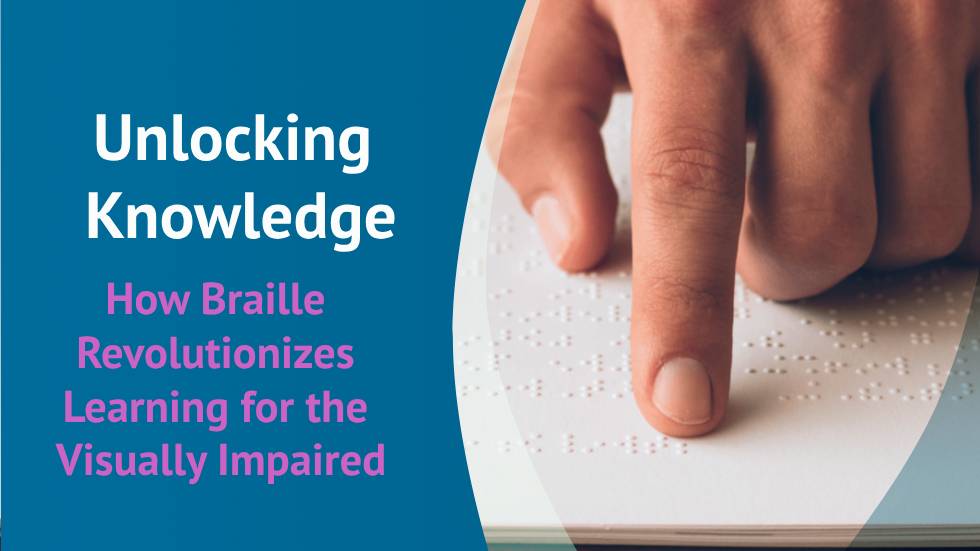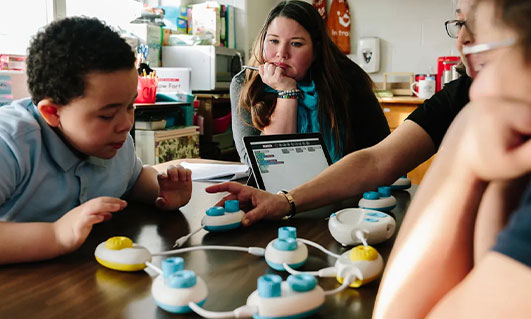
Braille, a tactile writing system used by the visually impaired, represents more than just a means of reading and writing; it is a powerful tool that opens doors to education, independence, and empowerment. The lifelong impact of Braille extends beyond literacy, influencing various aspects of daily life and personal growth. This blog explores how Braille education empowers visually impaired individuals and its enduring benefits throughout their lives.
The Foundation of Literacy
Early Learning and Academic Success: Braille provides visually impaired children with the ability to read and write from an early age. Mastery of Braille enables them to engage in academic learning on par with their sighted peers. Early exposure to Braille enhances cognitive development, language skills, and academic achievement.
Access to Educational Materials: Braille ensures that visually impaired students have access to textbooks, literature, and other educational resources. This access is crucial for participating fully in classroom activities and achieving educational milestones.
Development of Critical Thinking: The ability to read independently fosters critical thinking and problem-solving skills. Braille empowers students to explore diverse subjects, conduct research, and engage in intellectual pursuits, contributing to their overall academic growth.
Empowerment Through Independence
Enhanced Daily Living Skills: Braille is not limited to educational settings; it also plays a key role in daily life. From reading labels and instructions to managing personal finances, Braille enables visually impaired individuals to perform daily tasks with greater independence and confidence.
Employment Opportunities: Proficiency in Braille can enhance employability by expanding career options. Individuals who can read and write Braille are better equipped to handle job-related tasks, such as reading documents, accessing information, and communicating effectively.
Increased Self-Reliance: Braille empowers individuals to manage their personal affairs independently. This includes activities such as writing letters, taking notes, and using technology, all of which contribute to greater self-reliance and autonomy.
Lifelong Benefits
Access to Information: Braille continues to provide access to information throughout a person’s life. Whether it’s reading newspapers, accessing digital content, or engaging with printed materials, Braille remains a valuable tool for staying informed and connected.
Cultural and Social Engagement: The ability to read and write in Braille enables participation in cultural and social activities. This includes reading books for pleasure, accessing art and literature, and engaging in community events, all of which enrich personal and social experiences.
Preservation of Personal Records: Braille is crucial for maintaining personal records, such as medical information, legal documents, and personal correspondence. The ability to keep and reference these records independently supports long-term organization and personal management.
Promoting Braille Literacy
Educational Programs: Schools and organizations should offer comprehensive Braille education programs to ensure that visually impaired students acquire proficient Braille skills. These programs should include early intervention, ongoing instruction, and opportunities for practical application.
Technology Integration: Incorporating Braille technology, such as Braille displays and electronic Braille books, enhances learning and accessibility. Technology can complement traditional Braille instruction and provide additional resources for learners.
Advocacy and Awareness: Raising awareness about the importance of Braille and advocating for its inclusion in educational and professional settings is crucial. Advocacy efforts can help secure funding, resources, and support for Braille literacy programs.
Support and Resources: Providing support for Braille learners, including access to Braille materials and trained instructors, ensures that individuals receive the assistance they need to succeed. Resources such as Braille libraries and tutoring services play a key role in supporting lifelong learning.
Conclusion
The impact of Braille extends far beyond the classroom, shaping the lives of visually impaired individuals in profound ways. By providing access to education, promoting independence, and offering lifelong benefits, Braille empowers individuals to lead fulfilling and self-sufficient lives. Investing in Braille literacy and support is an investment in the future, fostering a world where visually impaired individuals can achieve their full potential and contribute meaningfully to society.





